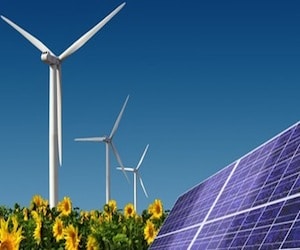A report from the Federal Energy Regulatory Commission’s Office of Energy Projects says that, in 2012, the capacity for renewable energy electrical generation accounted for almost 50% of all new installations for energy projects in the United States. This includes solar, biomass, geothermal, and water-based generation capacity.
On top of making up nearly half of all new installation, renewable energy generation capacity also increased by 51% over the previous year.
However, generation capacity and actual electrical generation are two very different things, and total renewable generation for the year 2012 only amounted to about 13% of total energy production last year in the U.S.
The amount of renewable energy produced in the U.S. last year was slightly less than the global average of 15%, meaning that America is not too far off the mark compared to the rest of the world. The UN Framework Convention on Climate Change has set a worldwide goal of 30% renewable energy by the year 2030, but they currently remain pessimistic about the ability of countries to achieve that goal, and believe that there could be at least a nine-percentage point deficit between reality and their goal.
So why the pessimism in the face of good news from the U.S.? The answer is shale gas.
Oil giant BP announced last week that the United States is on its way to becoming fully energy self-sufficient by 2030 – the same year that the UN is hoping countries will be relying more heavily on renewable energy – simply because of the massive shale gas reserves that are being exploited in the country.
BP predicts that shale gas and other “unconventional oil sources” will account for all of the energy growth over the next seven years, and about 70% of the growth from 2020 to 2030.
The White House has also signaled that they are wide open to increased exploitation of shale gas sources, hoping that the U.S. will become an energy exporter within the next decade.
The United States is well on its way to creating a renewable energy infrastructure that could finally kick our addiction to fossil fuels. Unfortunately, the powerful lobbyists and money flowing out of the dirty energy industry are pushing for expanded fracking and shale gas exploitation, and the sad reality in America is that, when it comes to influencing public policy, big money will usually prevail.
Subscribe to our newsletter
Stay up to date with DeSmog news and alerts






